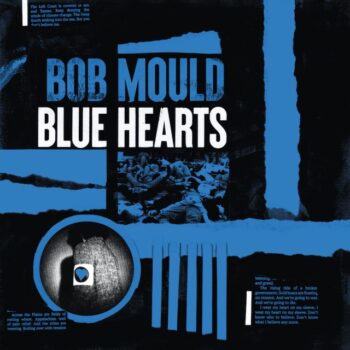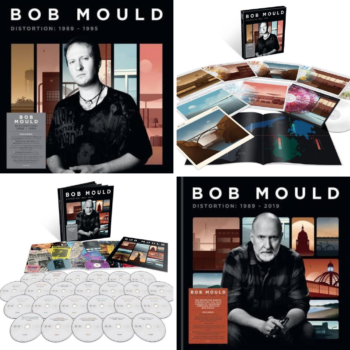Interview: Bob Mould Talks Blue Hearts with The 13th Floor
One quick listen to Bob Mould’s new album, Blue Hearts, and its clear that the rock & roll fire still burns through this man’s blood.
The former Husker Du front man has been on the solo train for over 30 years, with a box set, appropriately titled Distortion, due out soon.
But Mr Mould is on the horn with The 13th Floor’s Marty Duda to talk about his new album, Blue Hearts, released today.
Where’s last year’s Sunshine Rock was full of hopeful optimism, things have changed as is evident by the track American Crisis.
Follow Bob Mould: WEBSITE FACEBOOK YOUTUBE INSTAGRAM TWITTER SPOTIFY
Mould is calling from San Francisco, bathed in the orange glow of the California forest fires.
“We’re in deep shit now”, Mould has been quoted. How deep? Check out the interview and find out.
Listen to the interview with Bob Mould here:
Or, read a transcription here:
M: The song American Crisis, from what I understand you wrote that back in 2018 and it seemed very prescient, so I thought that would be a good way to kick it off.
B: Yeah, I wrote that song in 2018 while I was living in Berlin, Germany and yeah, it didn’t really fit with the prior album Sunshine Rock, which was ostensibly to be an optimistic record, and I think I succeeded in that. American Crisis didn’t really fit with that motif, and I had it in my back pocket as the next two years went on. So it was prescient in a sense, but none of it seems particularly outlandish. It was happening in 2018 and it’s certainly happening now.
M: Well yeah, you can say it’s relevant as today’s headlines. You’re talking about a nation in flames. What caused you to write that song at that point in time?
B: In 2018? Because that’s what it felt like was happening. I guess it wasn’t quite as pronounced as it became in early June of this year after the Breonna Taylor and especially George Floyd murders. When people actually did start remembering that when you feel voiceless, you do have the right to go to the street and peacefully protest. It was nice to see that the prevailing majority of Americans chose to do that. Unfortunately there’s always 1 to 3% on either side of the margin of any kind of peaceful protest that use that energy as a wedge to break laws…at least that’s been my experience in my lifetime with political protests.
M: What is your experience? Have you done much protesting in the past, like back in the 80s?
I was getting ready to talk about a song that foretold what was happening in America.
B: Yeah, a little bit in the late 70s and early 80s when I got to college, mostly protesting against the government, oddly enough, so that’s the usual source of consternation. Whoever’s in charge, right? But yeah, it was sad, it was not unfortunate but odd timing to have American Crisis be the lead track, you know, having finished it in February and decided back in April that it would be the lead track, and to have it come out as all the things were going on. It was a bit of an interesting proposition.
M: Did you worry about how it would be reacted to? Do you think about things like that when you put out a record?
 B: Yes, and I think in this case it was particularly concerning because unless you’ve actually written a song that foretells what’s happening in front of you, you don’t really have a handbook for how to work with that. Because you get to that point and you say, I say to myself yes, this is exactly what is happening. But we’re talking about loss of lives. We’re talking about Black Lives Matter, galvanising and at that point I have to consider whether it’s in proper form to be promoting a song for a record. It seems a little quaint compared to the reality of what’s happening in the world. So yeah, that was an interesting question that I had to ask myself for a couple of days as I was getting ready to talk about a song that foretold what was happening in America.
B: Yes, and I think in this case it was particularly concerning because unless you’ve actually written a song that foretells what’s happening in front of you, you don’t really have a handbook for how to work with that. Because you get to that point and you say, I say to myself yes, this is exactly what is happening. But we’re talking about loss of lives. We’re talking about Black Lives Matter, galvanising and at that point I have to consider whether it’s in proper form to be promoting a song for a record. It seems a little quaint compared to the reality of what’s happening in the world. So yeah, that was an interesting question that I had to ask myself for a couple of days as I was getting ready to talk about a song that foretold what was happening in America.
M: I have to say, after hearing the record the word ‘quaint’ never really entered my mind. It’s a full on sonic blast, and there’s a lot of anger and a lot of passion in what you’re singing about and how you’re singing. I’d like to talk a little bit about how you made a record that sounds like that and what kind of frame of mind you have to get yourself into to get that across on vinyl, or whatever it is these days.
 B: Yeah, definitely the idea was vinyl, for sure, as it always is with making records. As I said, I had that song which was written back in April ’18, for the song that became Forecast of Rain I had the musical sketch for it. Summer of 2019 after Sunshine Rock came out I was doing all the touring and stuff, I was playing a lot of shows while I was still over in Germany. I was playing solo electric festivals throughout the summer, playing a lot of guitar into the fall. About a year ago, I started getting a real weird sense of deja vu, thinking about three years of Trump and how much it felt like the first three years of Reagan. You know, the idea that you’ve got a television celebrity president who’s being propped up by the evangelicals. I guess I didn’t really bargain on Reagan taking five years to mention the word “Aids”, and now we’re in a pandemic and you really can’t write this stuff.
B: Yeah, definitely the idea was vinyl, for sure, as it always is with making records. As I said, I had that song which was written back in April ’18, for the song that became Forecast of Rain I had the musical sketch for it. Summer of 2019 after Sunshine Rock came out I was doing all the touring and stuff, I was playing a lot of shows while I was still over in Germany. I was playing solo electric festivals throughout the summer, playing a lot of guitar into the fall. About a year ago, I started getting a real weird sense of deja vu, thinking about three years of Trump and how much it felt like the first three years of Reagan. You know, the idea that you’ve got a television celebrity president who’s being propped up by the evangelicals. I guess I didn’t really bargain on Reagan taking five years to mention the word “Aids”, and now we’re in a pandemic and you really can’t write this stuff.
I can’t imagine what it is like for people of colour. As an older gay white man or even as a 22 year old gay white man, I could leave my house and pass for straight.
M: It’s amazing, it’s history repeating itself, it seems. I mean, I’m old enough to remember all of that stuff in the 80s, and to be very depressed about it all originally. To see it happening again is just incredible.
B: I guess for me, Marty, when the deja vu became clearer it just sent me looking back to who I was the first time. As a 20 year old gay kid in a punk rock band, who was sure of his sexuality but did not have a sexual identity, I was living in a country where the ‘moral majority’ was telling me this is my punishment for a lifestyle that I didn’t really understand, but I knew it was mine somehow.
M: How do you deal with that at 20 years old? It’s hard enough to deal with that when you’re 50, let alone 20.
 B: You don’t build that identity openly is what happens. I think that’s part of marginalisation in of itself, and we see that happening now in the trans community, you still see it in some degree in the LGBTQ community overall. I can’t imagine what it is like for people of colour. As an older gay white man or even as a 22 year old gay white man, I could leave my house and pass for straight whereas people of colour can not leave their house and pass as white, which is part of our white entitlement problem.
B: You don’t build that identity openly is what happens. I think that’s part of marginalisation in of itself, and we see that happening now in the trans community, you still see it in some degree in the LGBTQ community overall. I can’t imagine what it is like for people of colour. As an older gay white man or even as a 22 year old gay white man, I could leave my house and pass for straight whereas people of colour can not leave their house and pass as white, which is part of our white entitlement problem.
M: Absolutely.
B: So, these are the things to consider. When I’ve got a song that carries a narrative about looking back on my own life in the 80s, again I have to defer to the greater concern at the moment which is Black Lives Matter as opposed to railing about my former gay repression. I think you get the picture how it’s not a normal promotional cycle.
M: Yes, I do! The song Little Pieces on the album, that kind of fits in with what you’re talking about, looking back on yourself and dealing with ageing as well, would that be a fair assumption?
B: Yep, that’d be a fair assumption. That’s always a consideration as one gets older, you want to look back at what you did, what you didn’t do, what did we all achieve and what do we need at the end. How does the story end? It sits in an interesting place in the record, it’s a little more whimsical compared to all the fire and brimstone that occupies the first side, at least.
It’s a very visceral record. Most of it is built for the stage, built to be recorded quickly.
M: Yeah, definitely. There is some serious fire and brimstone. And then you get to a track like Everything To You, which almost has a flicker of optimism in it. At one point, you sing “I wish tomorrow was today”. So you’re looking forward, you’re cautiously optimistic, would I say?
B: Yeah, that was a 10 minute pop song! That was one of the lucky ones. Always nice to get a few of those when the rest of it feels a bit like a millstone at times.
M: The first 5 or 6 tracks are pretty full on. Do you think about how people are going to react to being confronted with something like that?
B: Yes, it was done with intent.
M: I love it.
 B: It was nice to have a 2 minute soliloquy before off to war we go. It’s a very visceral record. Most of it is built for the stage, built to be recorded quickly. Once I realised that American Crisis was the tent pole, I managed to tag down the other corners and fill out the fabric and write an album’s worth…the beauty of this record is that the methodology of writing very quickly, writing very simply and directly, and then taking those songs out and performing them for two and a half week doing solo electric shows around America, there’s a beauty to writing new material and mixing it in with material people know. You get a good sense of the strength of the material. People were coming up after the show…I go up to the merchandise table which sells stuff and sign stuff and say hi to friends… and universally people were thrilled with the new songs. I think the last show of the tour was on a Saturday, I flew on Sunday to Chicago and we started the record on the Monday. Our methodology of just showing up in the studio with a guitar, a pedal board, some clothes and some songs; that was very similar to the way I used to do things back in the 80s as well. That part of the methodology also shows up in the tone and the tenor and the feel of the record. I obviously knew what I was doing when I planned it that way, I was hoping for the results that we got, so it’s nice.
B: It was nice to have a 2 minute soliloquy before off to war we go. It’s a very visceral record. Most of it is built for the stage, built to be recorded quickly. Once I realised that American Crisis was the tent pole, I managed to tag down the other corners and fill out the fabric and write an album’s worth…the beauty of this record is that the methodology of writing very quickly, writing very simply and directly, and then taking those songs out and performing them for two and a half week doing solo electric shows around America, there’s a beauty to writing new material and mixing it in with material people know. You get a good sense of the strength of the material. People were coming up after the show…I go up to the merchandise table which sells stuff and sign stuff and say hi to friends… and universally people were thrilled with the new songs. I think the last show of the tour was on a Saturday, I flew on Sunday to Chicago and we started the record on the Monday. Our methodology of just showing up in the studio with a guitar, a pedal board, some clothes and some songs; that was very similar to the way I used to do things back in the 80s as well. That part of the methodology also shows up in the tone and the tenor and the feel of the record. I obviously knew what I was doing when I planned it that way, I was hoping for the results that we got, so it’s nice.
M: So the record’s coming out on the 25th, and as far as I can see there probably aren’t any live shows in the near future for you. How are you going to deal with the fact that you don’t have that interaction with fans when you can go out and sign things and talk about stuff ? Is that going to take away some of the thrill of putting this record out?
We like the guitars, we like the melodies, we like the noise.
B: I think it takes away some of the lustre of the whole campaign and the cycle itself. I mean, the album is what the album is and the response will be what it is. It’s a shame that we can’t get out and play, it was really a record meant to rally the troops and get everybody engaged as we head to November. I don’t have anything planned in that department right now. I guess the best I can hope for is that when I can go back to work and people can go back to enjoying my work in public, it will be a celebration instead of a call to arms.
M: Just talking about the recording of the record, you used Jason (Narducy) and John (Wurster) again, the two guys who recorded your previous album. What kind of connection and communication do you guys have when you put these tracks together?
B: Well, Jason and I have been friends for 30 years. We’ve worked side by side for a couple decades at least, not counting me helping Jason with his music in the 90s. John’s been behind the kit for 12 years now, so we’ve been at this over a decade with the 3 of us. This is the fifth record that we’ve made together for Merge Records. We all like the same things in music. We like the guitars, we like the melodies, we like the noise. We speak a very similar musical language most of the time. I think we’ve gotten much better at making records together, since this is number 5 with this configuration. I think for me as a writer, when I know the musicians I’m going to be recording with it makes it easier to write,because I sort of have their language in mind. Across 40 years I’ve worked with a lot of great musicians, and sometimes records are written in a vacuum and musicians are chosen to record records, and that does get a different result than when you know this strong suit of people who will be working for you. I would like to think that that’s a fairly good part of why these records keep getting better that the three of us are making.
 M: You mentioned that you’ve been doing this for over 40 years now, so do you give yourself the opportunity to look back and consider your legacy at this point?
M: You mentioned that you’ve been doing this for over 40 years now, so do you give yourself the opportunity to look back and consider your legacy at this point?
B: Yeah, I don’t if whoever set up this interview on your side lets you know that next month there’s a 30 year career retrospective box set coming out?
M: Oh yeah, that’s right! It’s like, how many CDs? It’s ridiculous.
B: Maybe this is a good time to plug that, that’s sort of the question you asked.
M: Absolutely! 24 CD box set, I love it.
B: Yeah, it encompasses everything from my first posters produced solo album which came out in 1989 called Workbook up to 2019 with Sunshine Rock. So 30 years of music, all of the studio works in that period, there’ll be 4 live concerts, there’s a lot of B sides and rarities. We’ve re-imagined all of the album art to try to tell more of a travel log story as opposed to a series of photo albums that are somewhat disconnected. It’s a big project, working with a company called Demon Music Group out of the UK. We’ve been talking about this for about 5 years, and fall 2020 was originally meant to be a quiet period for me. That’s why the box set was slated for now, but again Blue Hearts sort of wrote itself and I had to address that as well.
M: So how hands-on were you as far as putting together this box set? It’s called Distortion, right?
B: Distortion, yes. Very hands on, I’ve been working with the artist in Munich who re-imagined all the album art, working with the mastering house who was trying to get all the records to have a consistent sound from record to record. I’m self-managed right now, so all of the marketing decisions and staying on the distributors and making sure all the socials are up to speed, that’s all me.
M: Oh, that’s a fun stuff!
B: Well, it’s my job right now so I’ve been very very busy and grateful for that. I think for new fans the CD box is a great entry point, for the completists there’s four different vinyl box editions. We’ve staggered the 30 years across 4 box sets coming out in October and then 3 more coming out in 2021. So it’s really neat, it’s a really nice look back. A really good companion piece, I guess, for the autobiography, I put that out in 2011. It’s a whole lot of Bob!
I think we all just try to keep doing our work and hope for the best.
M: Are there any rarities or thingies that you dug up that you forgot about or rediscovered?
B: Well, it’s nice to share the demo version of The Daily Show theme. Then we sort of cleaned it up and reshaped it for the theme song that people have been hearing since ’96, but that was a nice thing to include. It was nice for the Foo Fighters to let me put that track I’ve worked with them on in the box set. There’s stuff like Throwing Muses and the Richard Thompson song and Golden Palominos. There’s stuff that I did with the late Vic Chestnut. There’s a lot of nice pieces there that were harder to find before Spotify.
M: Speaking of Throwing Muses, I just talked to Kristin Hersh the other day, and they’ve got an amazing record out as well. It seems like a lot of folks from that era are resurfacing and reasserting their voice these days, would you say that’s a fair thing to say?
B: I mean, Kristin never lets grass grow on her earthiness, she’s always with busy with stuff.
M: That’s true.
B: But yeah, I noticed that it’s a Throwing Muses proper record which will get attention, and that’ll be nice. I think everybody I know has been staying as busy as they can, and it’s a different world of popular music than it was on the 80s for sure. Not only the music but the business is way different. I think we all just try to keep doing our work and hope for the best.
M: Exactly. Well, hopefully you’ll get to get on stage at some point and get to meet the folks who are buying your music, we’ll see how that goes. I hope you guys stay safe in California; some of the images we see on the news are just mind-blowing.
B: Yeah, that orange was as you see it in the photos. It was pretty weird. I mean, San Francisco, we’re an island here in a sense, much like you are. We’re terribly progressive, and everybody’s been very good about the masks. We’ve been diligent here and we haven’t really suffered like New York did or like the South is suffering now. We have very low transmission and low death rates. I’m guessing 1981 might have had a little bit to do with it too, I think people in San Francisco are sort of in tune with the epidemics. At least, better than 1918 where we fucked up real big.
M: It’s always a learning process! Well, thank you for taking the time to talk to me. I hope the record does everything it needs to do and that people get to hear it and see and hear you sometime soon. Stay safe, and hopefully you’ll come down to New Zealand so we can see you sometime.
B: Alright, thank you Marty, take care.